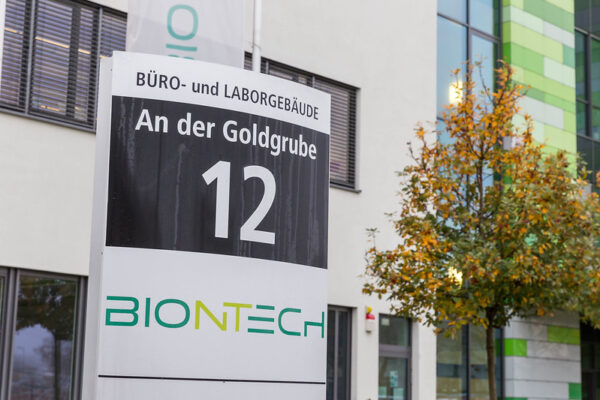
BioNTech has turned to dealmaking yet again to diversify its cancer drug pipeline, paying $170 million to begin an alliance with Duality Biologics. The deal includes a clinical-stage drug candidate with the potential to compete against an AstraZeneca medicine whose recent expanded approvals in breast and lung cancers position it to become a blockbuster seller.
The upfront payment gives BioNTech global rights to two DualityBio drug candidates. According to terms of the deal announced Monday, the German company has the right to develop and commercialize both of them worldwide, except for China, where Shanghai-based DualityBio retains rights.

Behavioral Health, Interoperability and eConsent: Meeting the Demands of CMS Final Rule Compliance
In a webinar on April 16 at 1pm ET, Aneesh Chopra will moderate a discussion with executives from DocuSign, Velatura, and behavioral health providers on eConsent, health information exchange and compliance with the CMS Final Rule on interoperability.
BioNTech’s initial work focused on developing messenger RNA vaccines for cancer, and that research is ongoing. The pipeline also includes cell therapies, one small molecule, and antibody drugs. The DualityBio deal enables BioNTech to expand its scope in antibodies by adding antibody drug conjugates (ADCs) to the pipeline. ADCs pair the targeting ability of an antibody with a cancer-killing drug payload. The field of ADC research has picked up momentum with several such drugs landing regulatory approvals in recent years. Last month, Pfizer agreed to pay $43 billion to acquire Seagen, an ADC specialist with three of the 12 FDA-approved drugs in the class.
DualityBio says its technology platform enables it to design ADCs with a wider therapeutic window, the dose range in which a drug can be effective while causing minimal toxic effects. A wider therapeutic window means an ADC can achieve higher doses to offer a more potent strike to cancer cells.
The more advanced of the two DualityBio ADCs is DB-1303. This drug was designed to address cancers that express HER2, a protein that drives tumor growth. DB-1303 has reached Phase 2 testing as a potential treatment for solid tumors. In addition to addressing tumors that are positive for HER2, DualityBio says this drug has also shown activity against HER2 low cancers, which are characterized as having low levels of the HER2 protein. The ability to treat HER2 low cancers could make the drug competitive with Enhertu, an ADC developed by partners AstraZeneca and Daiichi Sankyo. Enhertu won its initial approval in breast cancer in 2019, then won expanded approval last year to address HER2 low-breast cancer patients, which brings the drug to a much broader patient population. Enhertu then won yet another approval last year in non-small cell lung cancer, the most common type of lung cancer.
The second DualityBio drug coming to BioNTech is DB-1311, a preclinical ADC that is also in development for solid tumors. The target of this ADC has not been disclosed, but similar to its HER2-targeting drug, DualityBio says this drug has a wide therapeutic window that supports the development of the drug across many types of cancers. For both DualityBio ADCs, BioNTech could be responsible for more than $1.5 billion in milestone payments. If the ADCs reach the market, DualityBio would also receive royalties from BioNTech’s sales of the drugs.

A Deep-dive Into Specialty Pharma
A specialty drug is a class of prescription medications used to treat complex, chronic or rare medical conditions. Although this classification was originally intended to define the treatment of rare, also termed “orphan” diseases, affecting fewer than 200,000 people in the US, more recently, specialty drugs have emerged as the cornerstone of treatment for chronic and complex diseases such as cancer, autoimmune conditions, diabetes, hepatitis C, and HIV/AIDS.
BioNTech has become an active dealmaker. In January, the company struck a £362 million (about $449 million) deal to acquire artificial intelligence startup InstaDeep. Last month, BioNTech agreed to pay $200 million up front to license rights to OncoC4’s lead program, an antibody drug that addresses a target on immune cells called CTLA-4.
In BioNTech’s announcement of 2022 financial results last week, the company reported a cash position of about €13.8 billion (more than $15.1 billion). Chief Financial Officer Jens Holstein said the financial success of the company’s Covid-19 vaccines provides a springboard from which the company can diversify its pipeline. Noting the recent InstaDeep and OncoC4 deals, he added that BioNTech is open to more business development moves.
“As a science and innovation driven company, we plan to continue to invest heavily in R&D and are willing to invest in mergers and acquisitions as well as collaborations to create future growth for the company,” Holstein said.
Photo by Flickr user Marco Verch via a Creative Commons license












